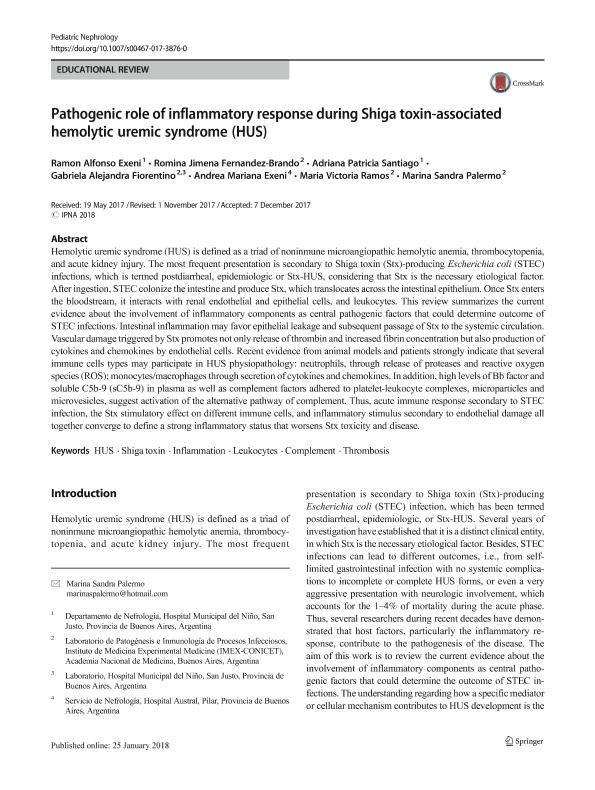Artículo
Pathogenic role of inflammatory response during Shiga toxin-associated hemolytic uremic syndrome (HUS)
Exeni, Ramon Alfonso; Fernández Brando, Romina Jimena ; Santiago, Adriana Patricia; Fiorentino, Gabriela Alejandra
; Santiago, Adriana Patricia; Fiorentino, Gabriela Alejandra ; Exeni, Andrea Mariana; Ramos, Maria Victoria
; Exeni, Andrea Mariana; Ramos, Maria Victoria ; Palermo, Marina Sandra
; Palermo, Marina Sandra
 ; Santiago, Adriana Patricia; Fiorentino, Gabriela Alejandra
; Santiago, Adriana Patricia; Fiorentino, Gabriela Alejandra ; Exeni, Andrea Mariana; Ramos, Maria Victoria
; Exeni, Andrea Mariana; Ramos, Maria Victoria ; Palermo, Marina Sandra
; Palermo, Marina Sandra
Fecha de publicación:
11/2018
Editorial:
Springer
Revista:
Pediatric Nephrology
ISSN:
0931-041X
Idioma:
Inglés
Tipo de recurso:
Artículo publicado
Clasificación temática:
Resumen
Hemolytic uremic syndrome (HUS) is defined as a triad of noninmune microangiopathic hemolytic anemia, thrombocytopenia, and acute kidney injury. The most frequent presentation is secondary to Shiga toxin (Stx)-producing Escherichia coli (STEC) infections, which is termed postdiarrheal, epidemiologic or Stx-HUS, considering that Stx is the necessary etiological factor. After ingestion, STEC colonize the intestine and produce Stx, which translocates across the intestinal epithelium. Once Stx enters the bloodstream, it interacts with renal endothelial and epithelial cells, and leukocytes. This review summarizes the current evidence about the involvement of inflammatory components as central pathogenic factors that could determine outcome of STEC infections. Intestinal inflammation may favor epithelial leakage and subsequent passage of Stx to the systemic circulation. Vascular damage triggered by Stx promotes not only release of thrombin and increased fibrin concentration but also production of cytokines and chemokines by endothelial cells. Recent evidence from animal models and patients strongly indicate that several immune cells types may participate in HUS physiopathology: neutrophils, through release of proteases and reactive oxygen species (ROS); monocytes/macrophages through secretion of cytokines and chemokines. In addition, high levels of Bb factor and soluble C5b-9 (sC5b-9) in plasma as well as complement factors adhered to platelet-leukocyte complexes, microparticles and microvesicles, suggest activation of the alternative pathway of complement. Thus, acute immune response secondary to STEC infection, the Stx stimulatory effect on different immune cells, and inflammatory stimulus secondary to endothelial damage all together converge to define a strong inflammatory status that worsens Stx toxicity and disease.
Palabras clave:
COMPLEMENT
,
HUS
,
INFLAMMATION
,
LEUKOCYTES
,
SHIGA TOXIN
,
THROMBOSIS
Archivos asociados
Licencia
Identificadores
Colecciones
Articulos(IMEX)
Articulos de INST.DE MEDICINA EXPERIMENTAL
Articulos de INST.DE MEDICINA EXPERIMENTAL
Citación
Exeni, Ramon Alfonso; Fernández Brando, Romina Jimena; Santiago, Adriana Patricia; Fiorentino, Gabriela Alejandra; Exeni, Andrea Mariana; et al.; Pathogenic role of inflammatory response during Shiga toxin-associated hemolytic uremic syndrome (HUS); Springer; Pediatric Nephrology; 33; 11; 11-2018; 2057-2071
Compartir
Altmétricas



